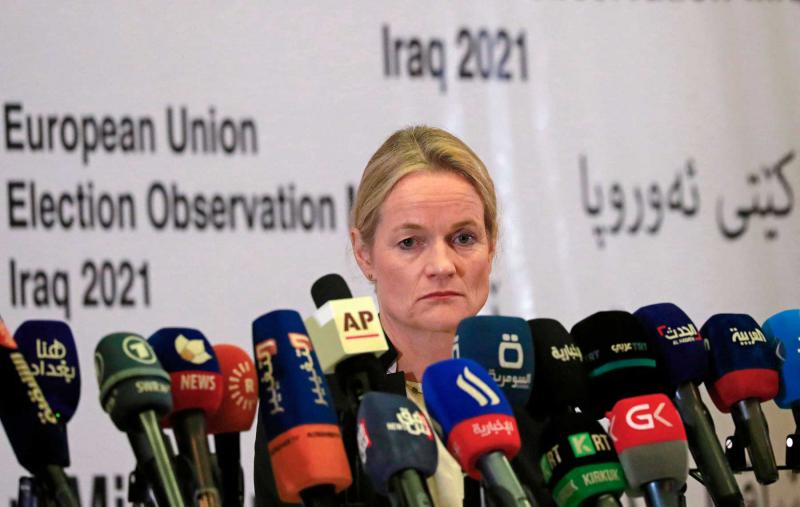The exchange of accusations between the factions and militias about fraud in Iraq’s Sunday elections cannot hide the fact that Iran is emerging as the winner in the electoral contest despite the defeats of loyal allies.
Analysts point to two main reasons for tempering early conclusions about Iranian setbacks in Iraq. The first is that Tehran’s allies have in fact obtained enough seats to control parliament. The second is that the electoral results are likely to enable pro-Iran factions to eventually enter into alliances that will provide them with opportunities to lay their hands on the new government.
Intensive contacts are ongoing in Baghdad to build a new alliance between traditionally pro-Iran groups as they jockey for position in the new government, which is expected to be controlled by the Sadrist movement with the support of Tehran.
Iraqi political analysts agree that the exchange of accusations between political groups loyal to Iran after their failure to enter parliament does not change the fact that the path is now open for Iran to easily build parliamentary and governmental alliances so as to maintain its strategic clout in Iraq.
Unhappy with the results, some of the Shia forces loyal to Iran have denounced what they called “fraud” and “manipulation” of the election results.
The Al-Fatah Alliance, which includes the Popular Mobilisation Forces (PMF) militias besides other pro-Iran factions, saw a significant decline of its representation in the new parliament, having been the second force in the outgoing chamber.
The movement remains, however, a key player in the Iraqi political scene. Its sway is buttressed by the fact it will continue to wield disproportionate influence with the armed militia force under its control. Analysts point out that the political game in Iraq is not confined to the corridors of parliament, as armed militias play an influential role in building or disbanding alliances.
Preliminary results published by the High Electoral Commission showed that the Sadrist movement, led by Shia cleric Muqtada al-Sadr, came to the fore with more than 70 seats in the 329-seat Parliament.
The coordination body of Shia forces, which includes in particular the Al-Fatah Alliance and the coalition of former Prime Minister Haider Al-Abadi, said in a statement, “We announce that we intend to challenge the announced results and our rejection of them and we will take all available measures to prevent voter manipulation.”
Hadi al-Amiri, head of the Al-Fatah Alliance, said, “We do not accept these fabricated results, at any cost and we will defend the votes of our candidates and the electorate with full force.”
If the new results are confirmed, the Sadrist movement will have achieved remarkable progress over 2018 when its Sairoon Alliance garnered 54 seats. The results will give the movement priority in appointing the prime minister and holding a number of key portfolios, especially the ministries of interior, finance and oil. Despite its election proclamations of nationalism, independence and aversion to corruption, the Sadrist movement enjoys the support of Iran, which seeks to renew its means of control of the Iraqi political scene.
In parallel, the defeated traditional faces allied to Iran are working to build a new alliance that brings together former Prime Minister Nuri al-Maliki, Hadi al-Amiri and Qais al-Khazali (head of Asaib Ahl al-Haq), in a frantic race to win Iran’s trust and support during the distribution of portfolios in the new government.
Experts believe that the fragmentation of the new parliamentary landscape will lead to the absence of a clear majority which will compel blocs to form alliances in order to agree on a new prime minister.
The Rule of Law coalition headed by Maliki was able to achieve a breakthrough by garnering 37 seats in parliament, according to a coalition official.
The Taqaddom party, led by Parliament Speaker Muhammad al-Halbousi, said that it had won “more than 40 seats.” Imtidad, a new political movement linked to the protest movement, gained ten seats, in particular from the southern governorates.
In response to a question about the accusations of fraud made by pro-Iranian groups, the head of the European Union mission monitoring the electoral process, Viola von Cramon-Taubadel, said that “from our point of view, the process was well organised” and there is “no reason” for accusations of fraud.
The elections, the fifth since the fall of Saddam Hussein’s regime in 2003 after the US invasion, witnessed an unprecedented boycott rate. The official turnout was put at 41 percent, which is not surprising in a country where the majority of the public rejects the failed political system. Despite the enormous oil wealth enjoyed by Iraq, one-third of the population lives in poverty, while corruption is rampant at all levels of the state.
Source (Click Here)


 RSS Feed
RSS Feed